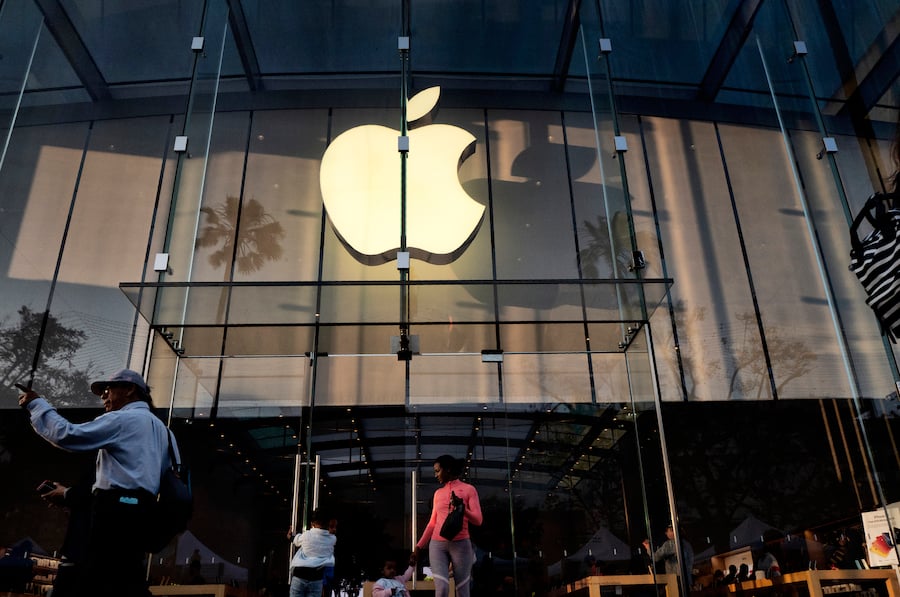SAN FRANCISCO (CN) — Apple has inched closer to ending more than eight years of litigation over claims it stiffed thousands of its retail employees in California for time spent undergoing security checks of their personal belongings.
Senior U.S. District Judge William Alsup granted preliminary approval to a $29.9 million settlement in an eight-page order issued Tuesday night.
The deal aims to compensate 14,683 current and former employees who worked at 52 Apple stores in California from July 2009 to December 2015, when Apple ended its bag-check policy for employees, aimed at preventing theft.
Lead plaintiff Amanda Frlekin sued the Cupertino-based technology giant in 2013, claiming it illegally withheld pay from workers who had to spend five to 20 minutes on average waiting for managers and security officers to search their bags and verify their Apple devices before they could leave for lunch breaks or at the end of shifts.
In 2015, Alsup granted summary judgment in favor of Apple, finding that because store employees chose to bring bags and Apple devices to work, they could not prove the bag checks were mandatory. He found Apple could have imposed an even stricter policy by banning workers from bringing bags or personal Apple devices to stores.
In September 2020, the Ninth Circuit reversed Alsup’s summary judgment following a decision by the California Supreme Court that found retail employees should be paid for time spent undergoing bag checks.
California Supreme Court Chief Justice Tani Cantil-Sakauye rejected the technology giant’s argument that employees could choose to leave their devices at home as inconsistent with “its description of the iPhone as an ‘integrated and integral’ part of the lives of everyone else.”
The high court also found Apple wielded control over its workers by forcing them to find a manager or security guard before they could leave the store.
In October 2020, the Ninth Circuit remanded the case to Alsup, including the question of whether Apple could pursue a separate line of defense — that the bag-check time was de minimus, or too minor or trivial to matter.
Before a new round of summary judgment motions could be decided, both sides announced a settlement in November. In a motion for preliminary approval of the deal, class attorney Lee Shalov of Mclaughlin and Stern in New York called it “the largest reported settlement in a security-search case in California.”
The $29.9 million deal includes $18.9 million in compensation for class members, $747,000 in payroll taxes and $449,000 in state penalties, 75% of which will go to California’s Labor and Workforce Development Agency as required under the state’s Private Attorneys General Act.
Each class member will receive about $1,300 on average as a pro rata share based on the number of shifts each employee worked according to Apple’s business records.
Class lawyers are seeking a third of the settlement fund, or $9.9 million, in attorneys’ fees.
Apple agreed not to oppose class lawyers' request to deduct at least 25% in attorneys' fees from the settlement fund, something Alsup identified as a cause for concern in his ruling.
“Our court of appeals has held that this is a red flag indicating a potentially collusive settlement,” Alsup wrote, noting he previously told both sides that such agreements should be avoided so the question of attorneys’ fees can be left up solely to the judge.
Alsup further criticized a provision seeking $10,000 awards for Frlekin and four other named plaintiffs, stating that, too, was a “red flag” that would not be accepted when the deal comes up for final approval.
Additionally, he demanded lawyers make the process for opting out of the settlement easier for class members. He insisted they drop requirements that class members use “magic words” to opt out. He further stated opts-outs should be accepted by electronic submission and not just mail.
On the failure to make compensation count as earnings for employee benefits, Alsup called it “a blow to those workers who should have received those benefits along with the wages earned.” However, the judge praised the deal for not requiring claim forms and thus making it easier for class members to get paid.
On average, class members will receive about 20% of the maximum they could get if they won at trial, according to Alsup’s ruling.
In balancing all the factors that must be considered for preliminary settlement approval, Alsup found they weigh in favor of tentatively accepting the deal.
Apple, its attorney Julie Dunne of DLA Piper in San Diego, and Shalov, the class lawyer, did not immediately return emails requesting comment Wednesday.
A final settlement approval hearing is scheduled for July 7.
Subscribe to Closing Arguments
Sign up for new weekly newsletter Closing Arguments to get the latest about ongoing trials, major litigation and hot cases and rulings in courthouses around the U.S. and the world.








